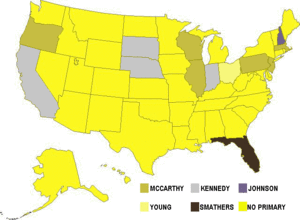- Democratic Party (United States) presidential primaries, 1968
-
Democratic Presidential Primaries, 1968 
1964 ← March 12, 1968 to June 11, 1968 → 1972 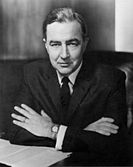
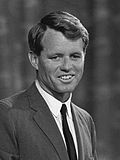
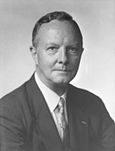
Nominee Eugene McCarthy Robert Kennedy Stephen M. Young Party Democratic Democratic Democratic Home state Minnesota New York Ohio States carried 6 4 1 Popular vote 2,914,933 2,305,148 549,140 Percentage 38.73% 30.63% 7.30% 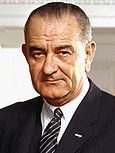
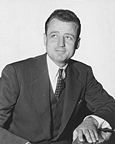
Nominee Lyndon B. Johnson George Smathers Party Democratic Democratic Home state Texas Florida States carried 1 1 Popular vote 383,590 236,242 Percentage 5.10% 3.14%
President before election
Democratic presidential candidate-elect
The 1968 Democratic presidential primaries were the selection process by which voters of the Democratic Party chose its nominee for President of the United States in the 1968 U.S. presidential election. Incumbent Vice President Hubert Humphrey was selected as the nominee through a series of primary elections and caucuses culminating in the 1968 Democratic National Convention held from August 26 to August 29, 1968 in Chicago, Illinois.
Contents
Primary race
Though President Lyndon B. Johnson had served during two presidential terms, the 22nd Amendment did not disqualify Johnson from running for another term, because he had only served 14 months following John F. Kennedy's assassination before being elected to his "second" term in 1964. As a result, it was widely assumed when 1968 began that President Johnson would be the Democratic nominee, and that he would have little trouble in winning the Democratic nomination.
Despite the growing opposition to Johnson's policies in Vietnam, no prominent Democratic candidate was prepared to run against a sitting President of his own party. Even Senator Robert F. Kennedy of New York, an outspoken critic of Johnson's policies with a large base of support, refused to run against Johnson in the primaries. Only Senator Eugene McCarthy of Minnesota proved willing to openly challenge Johnson. Running as an anti-war candidate in the New Hampshire primary, McCarthy hoped to pressure the Democrats into publicly opposing the Vietnam War. Normally, an incumbent president faces little formidable opposition within his own party. However, McCarthy, although he was trailing badly in the national polls, decided to pour most of his resources into New Hampshire, the first state to hold a primary election. He was boosted by thousands of young college students, who shaved their beards and cut their hair to be "Clean for Gene". These students rang doorbells and worked hard in New Hampshire for McCarthy. On March 12, McCarthy won 42% of the primary vote to Johnson's 49%, an amazingly strong showing for such a challenger, and one which gave McCarthy's campaign legitimacy and momentum. The momentum ended, however, when Senator Kennedy announced his candidacy four days later, on March 16, as McCarthy supporters cried betrayal and vowed to defeat Kennedy. Thereafter McCarthy and Kennedy would engage in an increasingly bitter series of state primaries; although Kennedy won most of the primaries, he could never shake McCarthy and his devoted following of antiwar activists, which included many Hollywood celebrities such as Paul Newman, Barbra Streisand, and Burt Lancaster.
Johnson withdraws
On March 31, 1968, following the New Hampshire primaries and Kennedy's entry into the election, the President startled the nation by announcing he would not seek re-election. (Not discussed publicly at the time was Johnson's concern that he might not survive another term - Johnson's health was poor, and he had suffered a serious heart attack in 1955. Johnson in fact died two days after the end of Richard Nixon's first term.) Bleak political forecasts also contributed to Johnson's withdrawal: internal polling by Johnson's campaign in Wisconsin, the next state to hold a primary election, showed the President trailing badly, and in fact he lost the primary to McCarthy. With Johnson's withdrawal, the Democratic Party quickly split into four factions, each of which distrusted the other three.
- The first faction comprised labor unions and big-city party bosses (led by Mayor Richard J. Daley). This group had traditionally controlled the Democratic Party since the days of President Franklin D. Roosevelt, and they feared their loss of control over the party. After Johnson's withdrawal this group rallied to support Hubert H. Humphrey, Johnson's Vice-President; it was also believed that President Johnson himself was covertly supporting Humphrey, despite his public claims of neutrality.
- The second faction, which rallied behind Senator McCarthy, was composed of students and intellectuals who had been the early activists against the war in Vietnam; they perceived themselves as the future of the Democratic Party.
- The third group was primarily composed of Catholics, African-Americans, and other racial and ethnic minorities; these groups rallied behind Senator Robert Kennedy.
- The fourth group consisted of conservative white Southern Democrats, or "Dixiecrats." Some members of this group (probably older ones remembering the New Deal's positive impact upon rural areas) supported Vice-President Humphrey, but most of them would rally behind George C. Wallace and the Alabama governor's third-party campaign in the general election.
Since the Vietnam War had become the major issue that was dividing the Democratic Party, and Johnson had come to symbolize the war for many liberal Democrats, Johnson believed that he could not win the nomination without a major struggle, and that he would probably lose the election in November to the Republicans. However, by withdrawing from the race he could avoid the stigma of defeat, and he could keep control of the party machinery by giving the nomination to Humphrey, who had been a loyal Vice-President. As the year developed, it also became clear that Johnson believed he could secure his place in the history books by ending the war before the election in November, thus giving Humphrey the boost he would need to win.[1]
Contest for the Democratic nomination
After Johnson's withdrawal, Vice President Hubert Humphrey announced his candidacy. Kennedy was successful in four primaries and McCarthy five; however, in primaries where they campaigned directly against one another, Kennedy won three primaries and McCarthy one. Humphrey did not compete in the primaries, leaving that job to favorite sons who were his surrogates, notably Senator George A. Smathers from Florida, Senator Stephen M. Young from Ohio, and Governor Roger D. Branigin of Indiana. Instead, Humphrey concentrated on winning the delegates in non-primary states, where party leaders such as Chicago Mayor Richard J. Daley controlled the delegate votes in their states. Kennedy defeated Branigin and McCarthy in the Indiana primary, and then defeated McCarthy in the Nebraska primary. However, McCarthy upset Kennedy in the Oregon primary. After Kennedy's defeat in Oregon, the California primary was seen as crucial to both Kennedy and McCarthy. McCarthy stumped the state's many colleges and universities, where he was treated as a hero for being the first presidential candidate to oppose the war. Kennedy campaigned in the ghettos and barrios of the state's larger cities, where he was mobbed by enthusiastic supporters. Kennedy and McCarthy engaged in a television debate a few days before the election, it was generally considered a draw. On June 4 Kennedy narrowly defeated McCarthy in California, 46% - 42%. However, McCarthy refused to withdraw from the Presidential race and made it clear that he would contest Kennedy in the upcoming New York primary, where McCarthy had much support from antiwar activists in New York City. The New York primary quickly became a moot point, however, for on the early morning of June 5, Kennedy was shot shortly after his victories in the California and South Dakota primaries; he died twenty-six hours later. Kennedy had just given his victory speech in a crowded ballroom of the Ambassador Hotel in Los Angeles; he and his aides squeezed into a kitchen on their way to another ballroom to celebrate their victory. In the kitchen's pantry, Kennedy and five other people were shot. Sirhan Sirhan, a young Palestinian militant who disliked Kennedy for his support of the state of Israel, was arrested, tried and convicted.
Political historians have debated to this day whether Kennedy could have won the Democratic nomination had he lived. Some historians, such as Theodore H. White and Arthur M. Schlesinger, Jr., have argued that Kennedy's broad appeal and famed "charisma" would have convinced the party bosses at the Democratic Convention to give him the nomination. However, other writers such as Tom Wicker, who covered the Kennedy campaign for The New York Times, believe that Humphrey's large lead in delegate votes from non-primary states, combined with Senator McCarthy's refusal to quit the race, would have prevented Kennedy from ever winning a majority at the Democratic Convention, and that Humphrey would have been the Democratic nominee even if Kennedy had lived. Journalist Richard Reeves has written that Humphrey was the likely nominee, and RFK's own campaign manager, future Democratic National Committee chairman Larry O'Brien, wrote in his memoirs that Kennedy's chances of winning the nomination had been slim, even after his win in California.
At the moment of RFK's death, the delegate totals were:
- Hubert Humphrey 561
- Robert Kennedy 393
- Eugene McCarthy 258
Primaries
Only 13 states held primaries at this time (California, Oregon, Nebraska, South Dakota, Wisconsin, Illinois, Indiana, Ohio, Pennsylvania, New Jersey, Massachusetts, New Hampshire and Florida)
Results by winners[2]:
Statewide results by winner
Eugene McCarthy Robert F. Kennedy Stephen M. Young Lyndon Johnson George Smathers Unpledged March 12 New Hampshire 42% 1% 0% 50% 0% 0% April 2 Wisconsin 56% 6% 0% 35% 0% 0% April 23 Pennsylvania 71% 11% 0% 4% 0% 0% April 30 Massachusetts 49% 28% 0% 3% 0% 0% May 5 Washington, D.C. 0% 0% 0% 0% 0% 100% May 7 Indiana 27% 42% 0% 0% 0% 0% May 7 Ohio 0% 0% 100% 0% 0% 0% May 14 Nebraska 31% 52% 0% 6% 0% 0% May 14 West Virginia 0% 0% 0% 0% 0% 100% May 28 Florida 29% 0% 0% 0% 46% 0% May 28 Oregon 44% 38% 0% 12% 0% 0% June 4 California 42% 46% 0% 0% 0% 0% June 4 New Jersey 36% 31% 0% 0% 0% 0% June 4 South Dakota 20% 50% 0% 30% 0% 0% June 11 Illinois 39% 0% 0% 1% 0% 0% Total popular vote[3]:
- Eugene McCarthy - 2,914,933 (38.73%)
- Robert Kennedy - 2,305,148 (30.63%)
- Stephen M. Young - 549,140 (7.30%)
- Lyndon B. Johnson - 383,590 (5.10%)
- Thomas C. Lynch - 380,286 (5.05%)
- Roger D. Branigin - 238,700 (3.17%)
- George Smathers - 236,242 (3.14%)
- Hubert Humphrey - 166,463 (2.21%)
- Unpledged - 161,143 (2.14%)
- Scott Kelly - 128,899 (1.71%)
- George Wallace - 34,489 (0.46%)
- Richard Nixon (write-in) - 13,610 (0.18%)
- Ronald Reagan (write-in) - 5,309 (0.07%)
- Ted Kennedy - 4,052 (0.05%)
- Paul C. Fisher - 506 (0.01%)
- John G. Crommelin - 186 (0.00%)
Gallery of candidates
-
Retired Admiral John G. Crommelin of Alabama
-
Businessman Paul C. Fisher of Pennsylvania
-
Vice President Hubert Humphrey of Minnesota
-
Senator Robert Kennedy of New York
-
President Lyndon Johnson of Texas
-
Senator Eugene McCarthy of Minnesota
-
Senator George McGovern of South Dakota
-
Governor Dan Moore of North Carolina
-
Senator George Smathers of Florida
-
Senator Stephen Young of Ohio
Democratic Convention and antiwar protests
Robert Kennedy's death altered the dynamics of the race, and threw the Democratic Party into disarray. Although Humphrey appeared the prohibitive favorite for the nomination, thanks to his support from the traditional power blocs of the party, he was an unpopular choice with many of the anti-war elements within the party, who identified him with Johnson's controversial position on the Vietnam War. However, Kennedy's delegates failed to unite behind a single candidate who could have prevented Humphrey from getting the nomination. Some of Kennedy's support went to McCarthy, but many of Kennedy's delegates, remembering their bitter primary battles with McCarthy, refused to vote for him. Instead, these delegates rallied around the late-starting candidacy of Senator George McGovern of South Dakota, a Kennedy supporter in the spring primaries, and who had presidential ambitions. However, by dividing the antiwar votes at the Democratic Convention, it made it easier for Humphrey to gather the delegates he needed to win the nomination.
When the 1968 Democratic National Convention opened in Chicago, thousands of young antiwar activists from around the nation gathered in the city to protest the Vietnam War. In a clash which was covered on live television, Americans were shocked to see Chicago police brutally beating anti-war protesters in the streets of Chicago. While the protesters chanted "the whole world is watching", the police used clubs and tear gas to beat back the protesters, leaving many of them bloody and dazed. The tear gas even wafted into numerous hotel suites; in one of them Vice-President Humphrey was watching the proceedings on television. Meanwhile, the convention itself was marred by the strong-arm tactics of Chicago's mayor Richard J. Daley (who was seen on television angrily cursing Senator Abraham Ribicoff of Connecticut, who made a speech at the convention denouncing the excesses of the Chicago police in the riots). In the end, the nomination itself was anticlimactic, with Vice President Humphrey handily beating McCarthy and McGovern on the first ballot. The convention then chose Senator Edmund Muskie of Maine as Humphrey's running mate. However, the tragedy of the antiwar riots crippled Humphrey's campaign from the start, and it never fully recovered. (White, pgs. 377-378;[4])
The Final Ballot Presidential tally Vice Presidential tally: Hubert Humphrey 1759.25 Edmund S. Muskie 1942.5 Eugene McCarthy 601 Not Voting 604.25 George S. McGovern 146.5 Julian Bond 48.5 Channing Phillips 67.5 David Hoeh 4 Daniel K. Moore 17.5 Edward M. Kennedy 3.5 Edward M. Kennedy 12.75 Eugene McCarthy 3.0 Paul E. "Bear" Bryant 1.5 Others 16.25 James H. Gray 0.5 George Wallace 0.5 Source: Keating Holland, "All the Votes... Really," CNN [5]
Endorsements
Hubert Humphrey
Robert Kennedy
- Senator Ralph Yarborough of Texas[3]
- Senator Abraham Ribicoff of Connecticut[3]
- Senator George McGovern of South Dakota[6]
- Senator Ted Kennedy of Massachusetts
- Governor Harold E. Hughes of Iowa[7]
- Senator Vance Hartke of Indiana[3]
- Writer Norman Mailer[3]
- Labor Leader Cesar Chavez[3]
- Actor Robert Vaughn[8]
Eugene McCarthy
- Representative Don Edwards of California[3]
- Actor Paul Newman[8]
- Actor Gene Wilder
George McGovern (during convention)
- Senator Abraham Ribicoff of Connecticut[4]
- Governor Harold E. Hughes of Iowa[4]
See also
References
- ^ Dallek (1998); Woods (2006); Gould (1993).
- ^ "Primaries, caucuses and conventions: Classic races for the presidential nomination". Oocities.com. Archived from the original on 2009-10-27. http://web.archive.org/web/20091027101746/http://geocities.com/Athens/Rhodes/3991/Dem1968.html. Retrieved 2010-06-17.
- ^ a b c d e f g "US President - D Primaries Race - Mar 12, 1968". Our Campaigns. http://www.ourcampaigns.com/RaceDetail.html?RaceID=47021. Retrieved 2010-06-17.
- ^ a b c "US President - D Convention Race - Aug 26, 1968". Our Campaigns. http://www.ourcampaigns.com/RaceDetail.html?RaceID=58481. Retrieved 2010-06-17.
- ^ "AllPolitics - 1996 GOP NRC - All The Votes...Really". Cnn.com. http://www.cnn.com/ALLPOLITICS/1996/conventions/san.diego/facts/weird.facts/votes.shtml.orig. Retrieved 2010-06-17.
- ^ "SD US President - D Primary Race - Jun 04, 1968". Our Campaigns. http://www.ourcampaigns.com/RaceDetail.html?RaceID=36014. Retrieved 2010-06-17.
- ^ "Candidate - Harold Everett Hughes". Our Campaigns. http://www.ourcampaigns.com/CandidateDetail.html?CandidateID=7375. Retrieved 2010-06-17.
- ^ a b "CA US President - D Primary Race - Jun 04, 1968". Our Campaigns. http://www.ourcampaigns.com/RaceDetail.html?RaceID=36010. Retrieved 2010-06-17.
United States presidential election, 1968 Republican Party
Convention · PrimariesNominee: Richard Nixon (campaign)
VP Nominee: Spiro Agnew
Candidiates: Frank Carlson · Clifford Case · Hiram L. Fong · John Lindsay · Ronald Reagan · Jim Rhodes · Nelson Rockefeller · Winthrop Rockefeller · George W. Romney · (campaign) · Harold Stassen · John A. VolpeDemocratic Party
Convention · PrimariesNominee: Hubert Humphrey (campaign)
VP Nominee: Edmund Muskie
Candidates: Roger D. Branigin · John G. Crommelin · Paul C. Fisher · Lyndon B. Johnson · Robert F. Kennedy (campaign) · Thomas C. Lynch · Eugene McCarthy (campaign) · George McGovern · Dan K. Moore · Channing E. Phillips · George Smathers · Stephen M. YoungAmerican Independent Party Other Third party and independent candidates Communist Party USA Peace and Freedom Party Prohibition Party Socialist Labor Party Socialist Workers Party Independents and other candidates: Other 1968 elections: House · Senate United States presidential primaries Election timelines National polling State polling Fundraising 2008Debates Straw polls Major Events Caucuses
and primariesResults breakdown National
conventionsDemocratic Party: 1900 · 1904 · 1908 · 1912 · 1916 · 1920 · 1924 · 1928 · 1932 · 1936 · 1940 · 1944 · 1948 · 1952 · 1956 · 1960 · 1964 · 1968 · 1972 · 1976 · 1980 · 1984 · 1988 · 1992 · 1996 · 2000 · 2004 · 2008 · 2012
Republican Party: 1900 · 1904 · 1908 · 1912 · 1916 · 1920 · 1924 · 1928 · 1932 · 1936 · 1940 · 1944 · 1948 · 1952 · 1956 · 1960 · 1964 · 1968 · 1972 · 1976 · 1980 · 1984 · 1988 · 1992 · 1996 · 2000 · 2004 · 2008 · 2012Reforms
Wikimedia Foundation. 2010.

